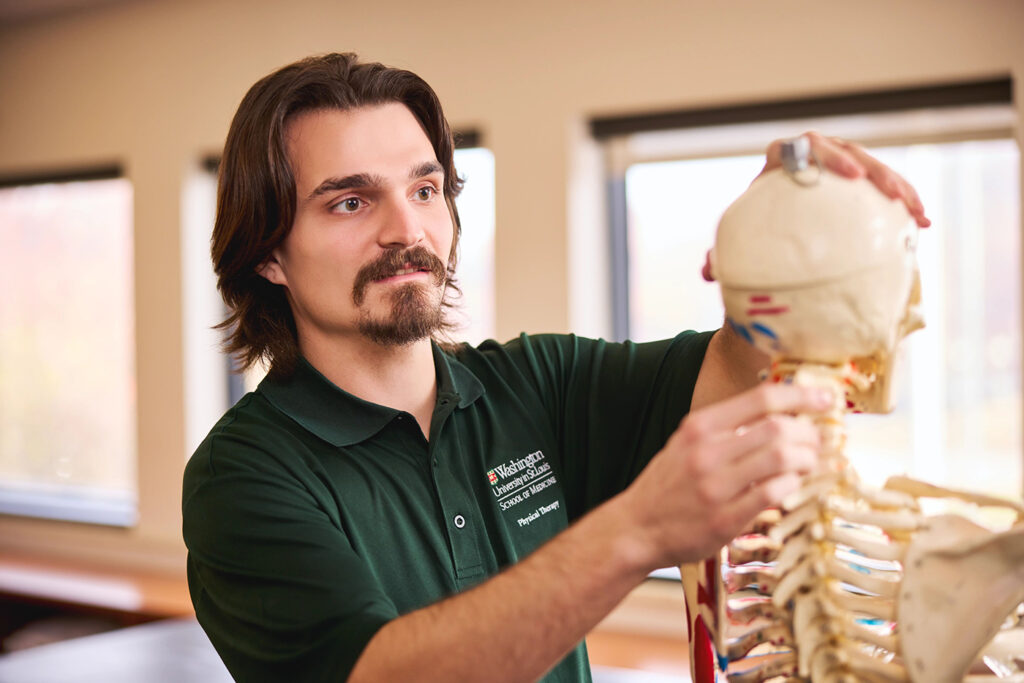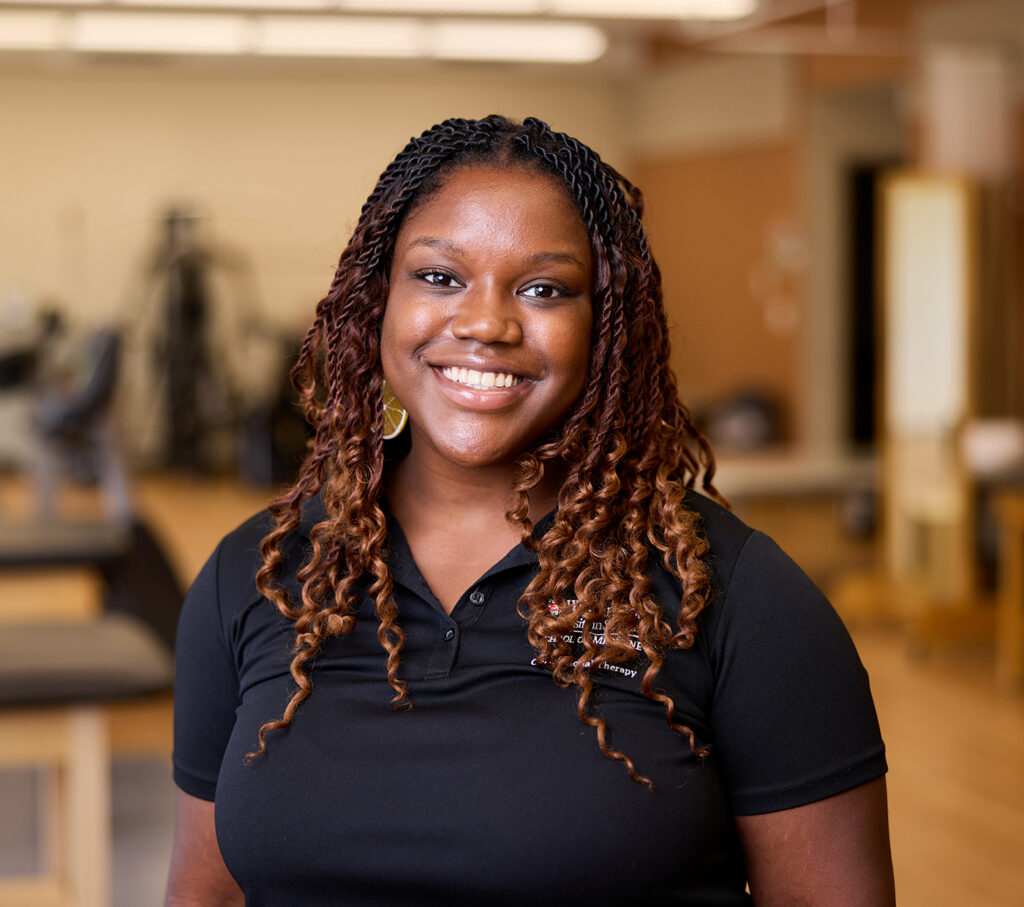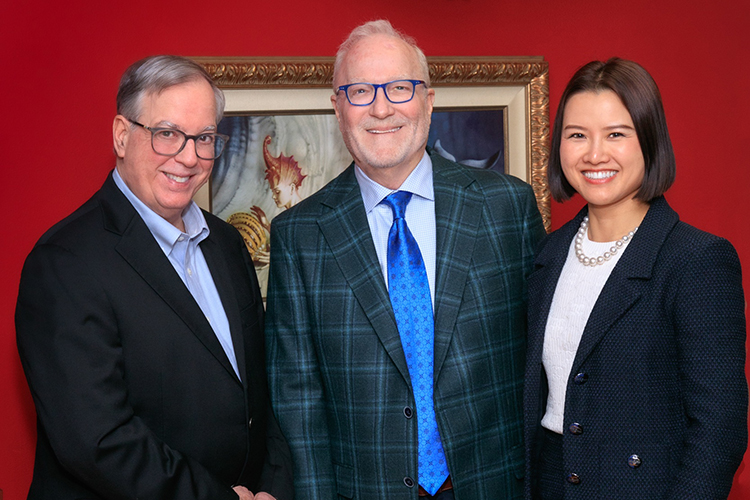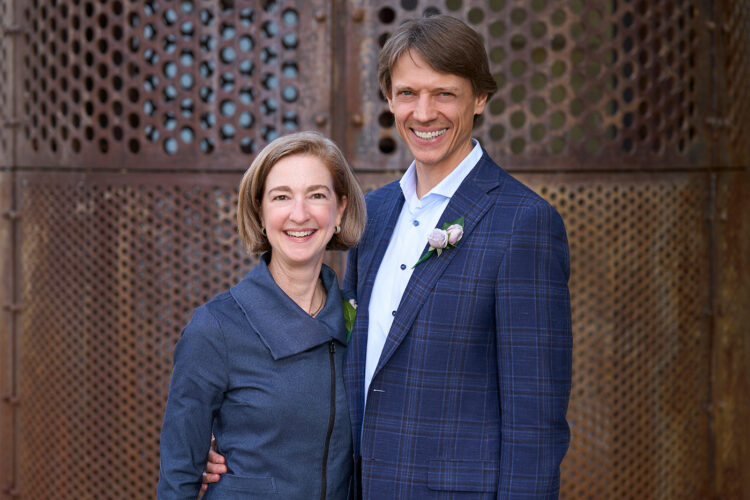Make Way for the class of tomorrow
Scholarships enhance the reputation of the School of Medicine’s world-class programs in physical therapy and occupational therapy and set graduate degree candidates like Leo Jacobs and Ronelle Williams on a path to become leaders in their fields.
The Make Way: Our Student Initiative fundraising effort aims to build financial resources for scholarships and fellowships so that talented students at the medical school and across the university can pursue their passions at WashU.
At age 15, Leo Jacobs knew he wanted to pursue physical therapy after helping care for his grandfather, who had been diagnosed with leukemia. Jacobs was a high school football player, so he had the strength to steady his grandfather during walks up and down the long driveway of their farm in rural Alabama. “I was a bit heftier back then, and my granddad was a pretty big dude,” he recalls. “I was one of the only grandkids that he felt comfortable around because he would have falls and I could catch him.”
Jacobs also enjoyed assisting his grandfather with light resistance band workouts to improve his balance. His experience ignited an interest in physical therapy that continued to grow throughout his teenage years. When he was 16, he began working as a physical therapy technician and found a side job helping a 10-year-old boy with a neurological disorder complete his exercise routine and daily tasks.
As an undergraduate at the University of Alabama at Birmingham, Jacobs studied kinesiology and earned his bachelor’s degree in three years to save money. Now in his third year of pursuing a Doctor of Physical Therapy at Washington University School of Medicine in St. Louis, he funds his education through a combination of student loans, part-time jobs, and scholarships. He credits his scholarships for helping allow him to pursue his graduate degree at WashU. “They mean everything to me,” he says. “They’re a recognition of all my hard work.”
Fueling success
Nearly half of all physical therapy students receive support from the School of Medicine’s Program in Physical Therapy, which annually awards more than $500,000 in scholarships. Each year, it gives out two half-tuition scholarships per cohort to students who have overcome obstacles and demonstrated resilience. These funds stay with recipients until graduation. The program also offers smaller merit and need-based scholarships.
Student debt, however, continues to be a pervasive challenge. The average debt for students who earned a doctorate in physical therapy from WashU in 2024 was $90,718. According to Gammon Earhart, associate dean and director of the Program in Physical Therapy, reducing the financial burden for graduates entering the field has long been a top priority. While the program’s average debt is lower than the national average of roughly $116,183, the need for student support remains critically important.
“WashU competes with a lot of other schools for top candidates,” says Earhart, who also serves as a professor of physical therapy, neurology, and neuroscience. “Scholarships enable students to obtain their degree here versus elsewhere.”
These financial resources make it possible for the Program in Physical Therapy to enroll outstanding students like Jacobs, who contribute to innovations in care and research during their studies. This leads to a higher level of excellence among practitioners in the field, which helps enhance the program’s reputation.
“The more accomplished a student is coming into the program, the more exceptional the graduate will be,” Earhart says. “Many students have already exhibited substantial leadership skills and potential as undergraduates. We build upon that and take pride in graduating people who become leaders in the profession.”
This chain reaction helps the program retain its U.S. News & World Report ranking as the No. 1 physical therapy program in the nation. Earhart says the standing prompts many prospective students to find WashU, particularly if they are not looking to come to the Midwest. “A lot of students tell us the reason they ultimately chose to study physical therapy at WashU was because it’s No. 1,” she says.
Learning beyond the classroom

Jacobs was drawn to WashU’s physical therapy program because of its renowned faculty and their deep expertise in movement science. However, he admits he was intimidated by his professors and terrified to look them in the eye during his first month. Now, they are on a first-name basis, and he attributes his mastery of material to their willingness to engage and work closely with students. “These are some of the smartest people on the planet, and working one-on-one with them is incredible,” Jacobs says. “There is a level of collaboration at WashU that doesn’t exist anywhere else.”
In his first year of the program, Jacobs served as a teaching assistant for the required first-year human anatomy class taught by Stacy Tylka, DPT, associate professor of physical therapy, orthopedic surgery, and obstetrics and gynecology. Though it is unusual for a first-year student to advise fellow first-year students, Tylka recognized Jacobs’ skills and enthusiasm and created a unique opportunity for him.
After graduation, Jacobs wants to specialize in treating children with neurological disorders. He is motivated to help others in part because of the scholarship donors who have invested in his potential. “My goal is to pay it forward by providing exceptional care for as many patients as possible.”
Creating pathways
Scholarships also help attract students to the medical school’s Program in Occupational Therapy, which is ranked No. 3 by U.S. News & World Report. “We have an incredibly talented group of students, and we want to continue to recruit the best of the best,” says Lisa Tabor Connor, associate dean for occupational therapy and director of the program. “There is considerable national competition for students, and we need to offer scholarships to remain competitive with other top programs.”
The occupational therapy program considers all applicants for merit scholarships and offers a limited number of need-based awards. Most admitted students receive financial support, but often at very modest levels. More scholarship funding will enable the program to provide greater financial resources and attract the highest-quality students, explains Connor, who also serves as the Elias Michael Professor of Occupational Therapy and professor of neurology.
Like their counterparts in physical therapy, debt is a significant concern for occupational therapy students. Connor says that most graduate from WashU with an average of $100,000 in accumulated debt — more than they will earn during their first year in the workforce. This income-to-debt ratio can have a negative impact on their lives, driving them to delay or forgo milestones such as homeownership or having children. It also can discourage them from choosing public service careers with potentially lower salaries.
“Our graduates are weighed down by debt when they leave, and that puts a tremendous burden on them,” Connor says. “Having that debt when they’re just beginning their careers or starting families is a big lift. We’d love to be able to help them by offering more scholarships.”
Scholarships also help create pathways for underrepresented students. This year, 18% of incoming occupational therapy students identify as students of color. Supporting these students contributes to building a more diverse health-care workforce. Connor says clients who receive care from providers who align with their own racial and ethnic backgrounds tend to have better outcomes.
Diversifying health care
Ronelle Williams, AB ’23, grew up in Atlanta and came to WashU as an undergraduate. While meeting with an academic adviser, she learned about the occupational therapy 3-3 program, which allows students to complete a bachelor’s degree and a clinical doctorate in six years.

Now in her third year of graduate studies, she works with Jessica Dashner, associate professor of occupational therapy and neurology, and fellow School of Medicine students at a pro-bono clinic. The student-run center provides multidisciplinary services to underinsured members of the St. Louis community, many of whom are Black. Williams says clients are often thrilled to be treated by someone who looks like them.
“I can feel it when I walk in the room,” she says. “Sometimes it’s verbally expressed, like when clients ask, ‘Are you going to be here next time?’ It’s a driving force in why I want to be an occupational therapist.”
During the 2022-23 academic year, Williams also served as one of five graduate fellows at WashU’s Center for the Study of Race, Ethnicity, & Equity. Her research there focused on the origins and prevalence of disordered eating patterns among Black women and girls, including how stereotypes often prevent people of color from receiving diagnoses and treatment. This work aligns with her interests in working with diverse clients and how to best approach their care.
Williams almost withdrew from the occupational therapy program last summer because her financial aid package did not cover the total cost of her education. A few weeks later, she was overjoyed when she received a scholarship award. “If I didn’t get that scholarship, I wouldn’t have been able to continue the program,” she says.
Today, she is part of the occupational therapy program’s inaugural cohort of School-Based Scholars. The scholarship program, which was made possible by a five-year grant from the U.S. Department of Education to the Program in Occupational Therapy, recruits and trains Doctor of Occupational Therapy candidates to practice in school settings and work with children and adolescents who have high-intensity needs.
When she is not studying or conducting research, Williams works part time as a babysitter or as a home health aide. After falling in love with St. Louis as an undergraduate, she enjoys exploring the city through restaurants and concerts. She is grateful that her scholarship provides peace of mind and the financial freedom to focus on her well-being.
“The support makes a huge difference,” she says. “I’m not worried about what I will eat. I have more options about where I want to live, and I’m not stuck in an apartment where I don’t feel safe. I can even afford to go out with friends occasionally. Scholarships allow students like me to relax a little bit and not worry that we don’t have enough money or time because we must work. It’s freeing.”


